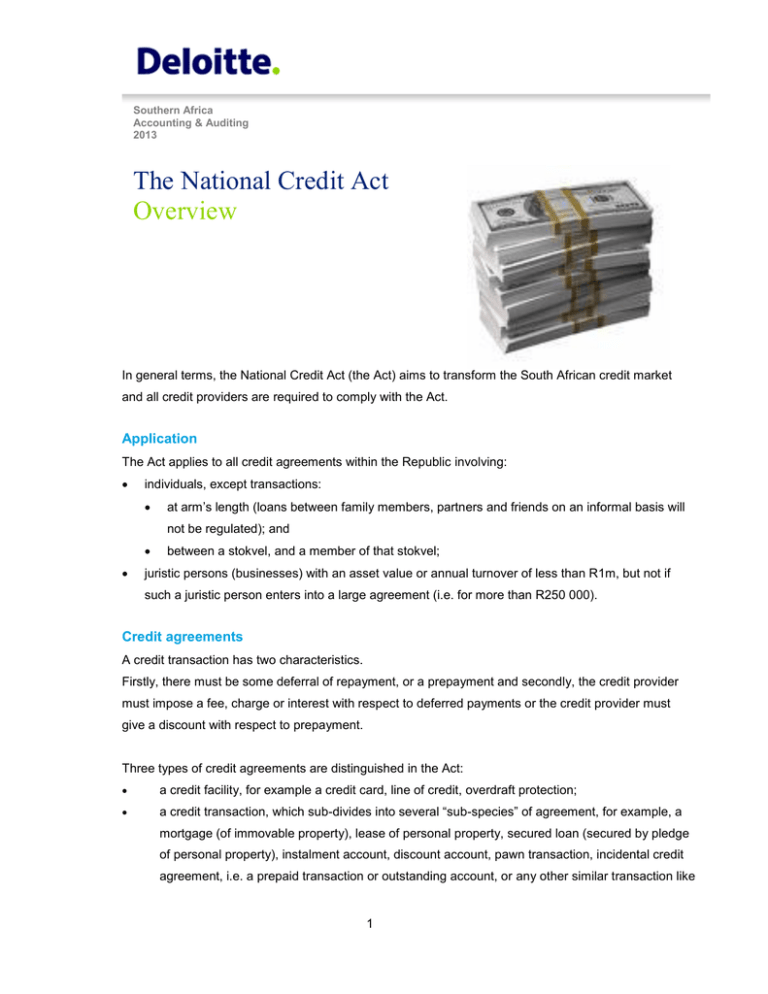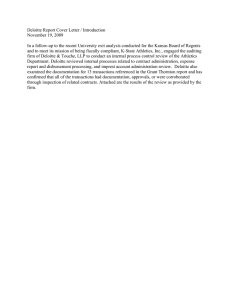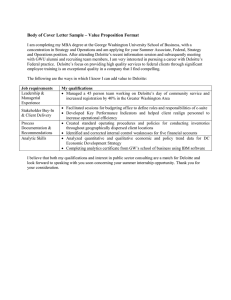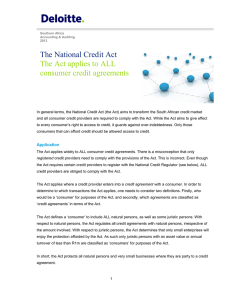
Southern Africa
Accounting & Auditing
2013
The National Credit Act
Overview
In general terms, the National Credit Act (the Act) aims to transform the South African credit market
and all credit providers are required to comply with the Act.
Application
The Act applies to all credit agreements within the Republic involving:
individuals, except transactions:
at arm’s length (loans between family members, partners and friends on an informal basis will
not be regulated); and
between a stokvel, and a member of that stokvel;
juristic persons (businesses) with an asset value or annual turnover of less than R1m, but not if
such a juristic person enters into a large agreement (i.e. for more than R250 000).
Credit agreements
A credit transaction has two characteristics.
Firstly, there must be some deferral of repayment, or a prepayment and secondly, the credit provider
must impose a fee, charge or interest with respect to deferred payments or the credit provider must
give a discount with respect to prepayment.
Three types of credit agreements are distinguished in the Act:
a credit facility, for example a credit card, line of credit, overdraft protection;
a credit transaction, which sub-divides into several “sub-species” of agreement, for example, a
mortgage (of immovable property), lease of personal property, secured loan (secured by pledge
of personal property), instalment account, discount account, pawn transaction, incidental credit
agreement, i.e. a prepaid transaction or outstanding account, or any other similar transaction like
1
an unsecured loan; and
a credit guarantee.
Enforcement of the Act
The National Credit Regulator is established as the primary administrative regulator under the Act, to
carry out education, research, policy development, registration of industry participants, investigate
serious complaints, and ensure enforcement of the Act.
The National Consumer Tribunal will adjudicate on a wide variety of applications, and conduct hearings
into complaints under the Act.
Registration as a credit provider
All credit providers must register, except a person who provides incidental credit; or has fewer than 100
agreements, or a total outstanding book of credit equal to or less than R500 000.
All credit bureaux and debt counsellors must register.
Elements of the Act
Consumer rights protected
The Act entrenches a number of fundamental rights of consumers in the credit market, including
protection against discrimination in credit granting, the right to be given reasons for credit being
refused, or discontinued, the right to information relating to the agreement, in an official language, and
in plain and understandable language, and the right to choose whether to receive certain documents
electronically or in paper copy.
Certain marketing practices outlawed
To restrain or correct the worst abuses in the area of credit marketing, the Act introduces, or re-enacts
a number of provisions to address, among others, the following:
negative option marketing (telling someone that they have agreed to buy credit unless they
specifically deny it in writing) is to be prohibited;
marketing of credit at the consumer’s home or workplace is significantly restrained, but allowed if
the consumer invites the credit provider to visit for that purpose; and
a credit provider who is required to be registered, but fails to do so, must not advertise credit.
Certain agreements are unlawful, and thus unenforceable
Certain agreements are unlawful, for example, if the consumer is a minor, mentally unfit, or subject to a
debt administration order, and the administrator has not consented, if the agreement results from
negative option marketing, if credit provider was unregistered and the Act required registration, or if the
agreement was formed by prohibited use of split documentation such that the unlawful provisions are
set out in a separate “agreement”.
2
If a Court declares a credit agreement to be unlawful, all its provisions are unenforceable, the
consumer is not required to return any goods or money received from the credit provider under the
agreement and the court may either order the credit provider to return all money received from the
consumer under the agreement or order such funds be forfeited to the State.
Certain provisions in an agreement are unlawful
The Act establishes a number of unlawful provisions of credit agreements. A provision is unlawful if its
general purpose is to defeat the policy and purposes of the Act, deceive the consumer, subject the
consumer to fraudulent conduct, or if it results from an improper negative option offer.
An unlawful provision of an agreement is void from the date of the agreement, and the court is
authorised to disregard such a provision and to nullify the entire agreement if the agreement does not
make sense without the unlawful provision.
Quotations
The credit provider must provide a prospective consumer with a quotation on the cost of credit, which
should be valid for 5 days – this is a quote on the cost of credit (interest rate and fees), not the value of
the asset. The quote must include both the main features of the proposed agreement, and a cost
quotation of the credit.
Reckless credit
The credit provider has to conduct a proper assessment of each consumer’s ability to meet obligations,
taking reasonable steps to investigate and evaluate the consumer’s:
understanding and appreciation of the obligations of the proposed agreement; and
ability to meet those obligations in a timely manner.
The credit provider must not enter into a reckless credit agreement. An agreement is reckless if the
credit provider fails to conduct the required evaluation, or having conducted it, enters into an
agreement with a consumer despite the fact that the available information to the credit provider
indicated that the consumer did not appreciate the nature of the obligations, or could not afford them.
However, if the Court is satisfied that the consumer failed to fully and truthfully answer any question for
information, the Court will not declare credit to be reckless.
If a Court finds that an agreement was reckless it may suspend the agreement. A suspended
agreement remains in force, but cannot be enforced until the consumer is able to afford it.
Charges
The Act stipulates that the Minister of Trade and Industry may limit or cap the maximum interest rate
and the permitted fees.
3
The credit provider is only permitted to charge:
interest;
an initiation fee (which may not be charged unless a credit agreement results from the
application); and
periodic or transaction-based service fees.
The only other fees or charges permitted include a default administration charge, collection costs,
extended warranty, delivery, installation and fuelling, connection and taxes.
Over-indebtedness
A consumer is over-indebted if, having regard to the consumer’s means, income and obligations, the
consumer cannot reasonably satisfy all obligations under credit agreements in a timely manner.
Consequences of over-indebtedness
A consumer may apply to a debt counsellor for review of debt, and the debt counsellor makes
recommendation to the Magistrate’s Court, which in turn may re-organise the consumer’s debt by
extending the term of any agreement, postponing payments, re-calculating unlawful fees or interest, or
ordering adjustments to improperly charged items.
Once a consumer applies to a debt counsellor, or a Court refers a case to a counsellor, and until the
process is complete or is terminated by notice:
the consumer is prohibited from entering into any fresh credit agreement, except to consolidate
existing obligations;
all credit providers under agreements being reviewed may not enforce those agreements; and
if a credit provider has notice of the review and enters into a new credit agreement, during that
time, that new agreement may be declared reckless.
If the debt review process does not conclude within 60 days, and the consumer is in default, a credit
provider may serve notice to end the process, so that the credit provider may approach the
Magistrate’s Court to enforce the agreement. In those circumstances, the court will have discretion to
order the debt review to continue in appropriate circumstances.
Business impact
The Act will inevitably change the manner in which businesses extend credit. Businesses should, for
example, be taking the following steps:
Determine whether registration as a credit provider is required;
Conduct a feasibility study, and determine how the Act will impact on the cost structure and
profitability;
Amend credit agreements and associated documents for the following reasons: Credit providers
4
have to ensure that their standard agreements comply with the Act; Agreements should be in
understandable language; Include all consumer rights; Certain information has to be disclosed,
in the required format, for example, quotations; Check for provisions that might be unlawful.
Ensure that documents are in an understandable language and that these documents are
available in at least 2 official languages (as cleared with the National Credit Regulator);
Amend systems to ensure that the business:
Calculates and charges only the permitted interest and fees;
These fees should be disclosed to the consumer in advance;
Although the Act allows for other incidental costs (taxes, installation, default
administration charges, etc) no other costs may be charged in relation to the credit
agreement.
Record transactional information so that the business is able to compile statistical returns
and compliance reports. Among others, credit providers need to be able to supply
information to the National Credit Regulator with reference to:
different types of credit agreements concluded, for example, mortgages, credit
facilities, personal loans, short term loans, unsecured credit;
the minimum and maximum interest and fees charged with reference to each type of
credit agreement concluded;
the number of credit agreements concluded with, for example, historically
disadvantaged persons, persons with low income, women, juristic persons, and
residents of rural or low density areas;
Design an affordability assessment test. This test needs to be applied each time a new credit
agreement is entered into to ensure that the consumer is not over-indebted;
Align marketing practices with the requirements of the Act;
Door-to-door selling is only allowed under very specific conditions;
training programmes for all staff should be implemented to ensure they understand and comply
with the requirements of the Act.
5
Queries: Dr Johan Erasmus – jerasmus@deloitte.co.za
Home | Security | Legal | Privacy
Deloitte refers to one or more of Deloitte Touche Tohmatsu Limited, a UK private company limited by guarantee, and
its network of member firms, each of which is a legally separate and independent entity. Please see
www.deloitte.com/about for a detailed description of the legal structure of Deloitte Touche Tohmatsu Limited and its
member firms.
Deloitte provides audit, tax, consulting and financial advisory services to public and private clients spanning multiple
industries. With a globally connected network of member firms in more than 150 countries, Deloitte brings world-class
capabilities and high-quality service to clients, delivering the insights they need to address their most complex
business challenges. Deloitte has in the region of 200 000 professionals, all committed to becoming the standard of
excellence.
This communication is for internal distribution and use only among personnel of Deloitte Touche Tohmatsu Limited,
its member firms and their related entities (collectively, the “Deloitte Network”). None of the Deloitte Network shall be
responsible for any loss whatsoever sustained by any person who relies on this communication.
© 2013 Deloitte & Touche. All rights reserved. Member of Deloitte Touche Tohmatsu Limited
6







